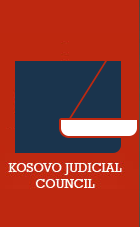Kosovo Judicial Council
Kosovo Judicial Council (Albanian: Këshilli Gjyqësor i Kosovës) (KJC) is the oversight body that aims to ensure the independence and impartiality of the judicial system, and the administration of justice in Kosovo.[lower-alpha 1]

The Kosovo Judicial Council is the highest oversight body of the Kosovo Judicial System and an independent institution, and its main responsibility is the administration of the entire Judicial System. The overall purpose of Kosovo Judicial Council, as mandated by the applicable legal framework is to ensure an independent, fair, apolitical, accessible, professional and impartial judicial system, which reflects the multi-ethnic nature of Kosovo as well as the internationally recognized principles of human rights and gender equality.
To fulfill this goal Kosovo Judicial Council is responsible for selecting and proposing judges for appointment, as well as for elaborating policies for the overall management and reform of the judicial system. Kosovo Judicial Council is the institution, which evaluates disciplines and promotes the sitting judges and lay judges. Furthermore, the Kosovo Judicial Council is responsible for the overall management and administration of all courts, for the elaboration and the implementation of the budget of the judiciary and for the establishment of new courts and court branches.[1][2]
Responsibilities
According to the Constitution of Kosovo, the Kosovo Judicial Council:
shall ensure the independence and impartiality of the judicial system.
The Kosovo Judicial Council is a fully independent institution in the performance of its functions.
The Kosovo Judicial Council shall ensure that the Kosovo courts are independent, professional and impartial and fully reflect the multi-ethnic nature of Kosovo and follow the principles of gender equality.
The Kosovo Judicial Council shall give preference in the appointment of judges to members of Communities that are underrepresented in the judiciary as provided by law.
The Kosovo Judicial Council is responsible for recruiting and proposing candidates for appointment and reappointment to judicial office. The Kosovo Judicial Council is also responsible for transfer and disciplinary proceedings of judges.
Proposals for appointments of judges must be made on the basis of an open appointmentprocess, on the basis of the merit of the candidates, and the proposals shall reflect principles of gender equality and the ethnic composition of the territorial jurisdiction of the respective court
All candidates must fulfill the selection criteria provided by law.The Kosovo Judicial Council is responsible for conducting judicial inspections, judicial administration, developing court rules in accordance with the law, hiring and supervising court administrators, developing and overseeing the budget of the judiciary, determining the number of judges in each jurisdiction and making recommendations for the establishment of new courts.
New courts shall be established according to law. The Kosovo Judicial Council shall be composed of thirteen (13) members, all of whom shall possess relevant professional qualifications and expertise.
Members shall be elected for a term of five (5) years and shall be chosen in the following manner:
• five (5) members shall be judges elected by the members of the judiciary; • four (4) members shall be elected by deputies of the Assembly holding seats attributed during the general distribution of seats; at least two (2) of the four (4) must be judges and one (1) must be a member of the Kosovo Chamber of Advocates; • two (2) members shall be elected by the deputies of the Assembly holding reserved or guaranteed seats for the Kosovo Serb community and at least one of the two must be a judge; • two (2) members shall be elected by the deputies of the Assembly holding reserved or guaranteed seats for other Communities and at least one of the two must be a judge. • Incompatibilities with membership on the Kosovo Judicial Council shall be regulated by law.
The Kosovo Judicial Council elects from its members a Chair and Vice Chair each for a term of three (3) years. Election to these offices does not extend the mandate of the members of the Kosovo Judicial Council.
The Chair of the Kosovo Judicial Council addresses the Assembly of the Republic of
Kosovo at least once a year regarding the Judicial System.
Notes
- Kosovo is the subject of a territorial dispute between the Republic of Kosovo and the Republic of Serbia. The Republic of Kosovo unilaterally declared independence on 17 February 2008, but Serbia continues to claim it as part of its own sovereign territory. The two governments began to normalise relations in 2013, as part of the 2013 Brussels Agreement. Kosovo is currently recognized as an independent state by 97 out of the 193 United Nations member states. In total, 112 UN member states recognized Kosovo at some point, of which 15 later withdrew their recognition.
References
- https://eeas.europa.eu/delegations/kosovo_hr/32055/Support%20to%20the%20Kosovo%20Judicial%20Council%20/%20Kosovo%20Prosecutorial%20Council
- Leposhtica, Labinot (4 April 2017). "BIRN writes a letter of concern to Kosovo Judicial Council". Prishtina Insight.
- "Article 108 [Kosovo Judicial Council], Constitution of Kosovo". Archived from the original on 27 May 2011. Retrieved 2017-02-08.